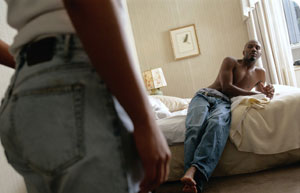Depressed and Hurting
My name is Aimee and I discovered I had AIDS on my 26th birthday this year.
I had a strange bruise-like spot on my left breast that continued to get bigger and bigger. Soon, it covered my entire breast. I went to 7 different doctors and no one knew what it was. I was admitted to hospitals, specialists took pictures and yet, it was a mystery. I went to a general surgeon on December 28, 2004 and had a biopsy done. He told me I would be OK. I had to get my stitches out on Thursday, Jan. 6, 2005---my 26th birthday. He told my mom and I that it was something called Kaposi's Sarcoma. Found only in end-stage AIDS patients. As you can imagine, my head was spinning. I had had an HIV test and a Hepatitis test in December and had not received word of the results. Thinking no news was good news, I assumed it was negative. It wasn't. The doctor just never contacted me to tell me the results.
I remember thinking that it was a nightmare and I would soon wake up. My family sat around and mourned for me. We all thought I was dead. I remember my dad crying out "My precious baby girl!" That was the first night I ever saw my dad get drunk. We just couldn't cope with the news. My family cried like wounded animals, and I was in a state of shock. I put the pieces together and now understood why I had been so very ill the last year. I had been hospitalized. I had shingles 3x and my hair was falling out. I had rashes on my skin that itched sooo bad. I would lay in bed for months at a time, having no energy. It would take everything I had just to get a shower and put make-up on. Doctors told me it was stress. I knew it was something serious, but never imagined AIDS.
continue story below
I went to an incredible Infectious Disease doctor who gave me my first ray of hope. He said it was no longer a death sentence, instead, a chronic disease and with a healthy lifestyle and medication, I could very easily live to be an old woman. WHAT? I was so excited. I had blood work done and my T-cell count was 15. My viral load was 750,000. I was almost dead. I weighed 95 lbs in contrast with my usual 130lbs. I started on the medications Sustiva and Truvada along with Bactrim and Zithromax. I've been on the meds now a month and a half and my T-call count is climbing! It was 160 last week and my viral load was 2,100. My doctor believes my viral load will soon be undetectable and my T-cell count over 200 in the next few months.
I have my life back. I've enrolled in grad school, run with my two dogs, work, work out at the gym, and enjoy life again. I'm even dating. If I can be brought back from near death......emotionally, spiritually and physically, then so can you! My outlook on life is this: Love as you've never loved before, dance as though nobody's watching, be truthful regardless of the cost and trust in yourself as well and the Lord. I am lucky enough to have a supportive family, friends and a love of the Lord that gets me through this. I am not angry.... saddened, yes, but not angry. I have forgiven those that I feel have done me wrong as I know the Lord will forgive me of my sins. I look forward to keeping in touch with all of you so when I dance at my children's' weddings. I will know I HAVE LIVED LIFE!
Imagine Loving Your Child
This story was originally written at Christmastime but its message, like that of Christmas, is important to remember every day. Used by permission of the author.
by Carol
Imagine loving your child, imagine being willing to do anything you could to protect your child, and now imagine knowing that this virus lives in your child, every day, every night, you can never escape and you can't let down your guard. Imagine, if it were YOUR child.
 As the holidays approach, we naturally think of children, happy, healthy children. We think of children enjoying Christmas and looking forward to many happy holidays. Unfortunately, some children, right here, children we pass every day, in the store, on the street, have AIDS. I know this because one of them is our son. He was born to a drug-addicted mother. She had AIDS and unknowingly passed the HIV virus to our child. We adopted him when he was 3 weeks old. Ten months later we found out he was HIV positive.
As the holidays approach, we naturally think of children, happy, healthy children. We think of children enjoying Christmas and looking forward to many happy holidays. Unfortunately, some children, right here, children we pass every day, in the store, on the street, have AIDS. I know this because one of them is our son. He was born to a drug-addicted mother. She had AIDS and unknowingly passed the HIV virus to our child. We adopted him when he was 3 weeks old. Ten months later we found out he was HIV positive.
We live here, we worship here, we are your neighbors. And there are others, men, women and children who live here and who are in hiding. At Christmastime, with our thoughts turned to the greatest gift of all, I hoped and prayed that we could all come out of hiding and feel safe. How wonderful it would be to know that if our neighbors found out about our child, and about all the other people here who are living with AIDS, that our neighbors would still look at us the same way. Would people still smile at him if they knew?
People always smile at our son. He is a beautiful child, full of mischief and always smiling at everyone. His dignity, courage and his sense of humor shine through the nightmare of this disease. He has taught me much over the years that I have been blessed to be his mother. His father adores him. His brother loves him. Everyone who has gotten to know him is amazed by him. He is bright, he is funny, and he is brave. For a long time, he has beaten the odds.
All of us, straight, gay, male, female, adult and child are threatened by this virus. We may think that it could never affect us (I thought so too), but this isn't true. Most of us think we can reduce the risk of infection by our behavior which is true to some degree. But what is totally true is that it is impossible to reduce or eliminate the risk of affection by this disease. We can not predict which one of us will love someone that has AIDS.
When you walk down a street and see the many different houses, you can't tell if a home is inhabited by AIDS. It could be the home of one of your friends, a family member or a co-worker. Everyone is afraid to talk about it but it exists and we all need to help. The very people the most afraid to tell you, are the ones the most in need of your love, support and prayers.
We know there are others like our child in the community who face these same issues every day. They, like our child need your support in so many ways. People who are living with AIDS need, housing, emotional support, medical care, and the ability to live their lives with dignity. People with AIDS have many of the same dreams, hopes and plans that everyone else has. We certainly had plans and dreams for our child, and we still do.
In the time our child has been with us, with all the many people who have known and loved him, medical professionals, teachers, friends, countless others, not one has been infected by him, but all of us have been affected by him in wonderful ways. He has enriched our lives and taught us many lessons.
Reach out and learn about AIDS for our sake and your own. Please look into your hearts and remember us in prayer today.
About the Author
You can write Carol at MamaCinPa@aol.com. She especially welcomes mail from other parents of children with HIV/AIDS. She wrote "Imagine" in December 1996. It was first published on the web on July 31, 2000.
Andy died in Danville, Pennsylvania, Sept. 13, 2001. He was only 12 years old. Carol has written a memorial about him.
Life with Alex
by Richard
(November 5, 1997) -- As I passed by my son Alex's bedroom on the way to bed myself, I heard him crying. I opened the door and found him sitting in his room sobbing uncontrollably. I invited Alex to lay down beside me in my bed and put my arms around him to comfort him.
After a short time, my wife came up to bed and found me holding Alex and stroking his head. When Alex finally began to calm down, we asked him what he was crying about. He told us he was scared. We asked him if he'd had a nightmare. He said that he had not even been to sleep.
It turns out that he was not scared of a dream, he was scared of reality. He told us he was afraid of his past and even more frightened by what the future held. You see, Alex deals with a nightmarish reality every day of his life. Alex lives with the nightmare called AIDS.
The Beginning of Alex's Life
This story about a child with AIDS starts at the beginning of Alex's life. When Alex was born he was delivered by C-section due to complications in the birthing process. His mother, Catherine, experienced post operative bleeding. She received a massive blood transfusion and further exploratory surgery to find the source of the bleeding. By the day's end, she was in intensive care in a coma.
During her recovery, under the advice of the pediatricians, Cathie breast-fed Alex. She had no idea that she had been infected with HIV.
continue story below
Nearly 2 years later, Cathie decided that she had a debt to pay. She had received the gift of life from those who donated the blood she had received at Alex's birth. She went to the local office of the American Red Cross to return the good will she had received. After a few weeks, we received a call from the Red Cross asking her to return to their office. They told her that she had tested positive for HIV, the virus associated with AIDS.
Subsequent testing of Alex showed that he was also HIV positive. We presume that he was infected via mother's milk, a known path of infection from an HIV positive mother to her baby.
Alex's Childhood
Alex has had a fairly normal childhood up until the last year. In his infancy, Alex was oblivious to his problem. As a toddler, he began receiving monthly immunoglobulin infusions and taking Septra as a prophylaxis against pneumocystis carinii pneumonia. Despite these inconveniences, we did our best to see to it that Alex had as normal a life as possible.
Life was not so normal for my wife and I, however. Aside from having to live with the fact that both Cathie and Alex were infected with HIV and would probably reach a premature end, we also had to deal with the ignorance and hatred of many people. We were afraid to tell even close friends and family members of our problems for fear we would loose their friendship.
Since Cathie has worked outside of the home off and on through the years, at times, Alex required day care. We were asked to remove Alex from one day care center, he was refused admission to at least two others, and has been refused admission to two different schools, one run by a Catholic church and the other at a Protestant church, all because of his HIV status.
Even the local public school asked us to delay his admission so they could do training. We had given the school board several months notice that our child, who was HIV positive, would be attending school there.
At the age of 6, Alex was diagnosed to have AIDS due to a diagnosis of lymphoid interstitial pneumonitis. As time went on, I found it increasingly difficult to remain silent about my family's problems and the ignorance we had faced in others. I'm not one to stick my head in the sand... I prefer tackling problems head on.
Going Public
With the support of my wife, I decided to go public with my family's story. I did this first by becoming a Red Cross HIV/AIDS Instructor. This, I felt would give me the opportunity to educate people of the facts concerning HIV and AIDS as well as an opportunity to share my personal story.
I took a week of vacation to attend the Red Cross course. During that week, I had to take Alex, now 7, to see his doctor at Children's Hospital. As we drove on the way to the hospital, I pointed out the Red Cross to Alex and told him that daddy was going to school there.
Alex looked very puzzled as he exclaimed, "But daddy! You're a grown-up! You're not supposed to go to school. What are you learning in school anyway?"
I told him that I was learning to teach people about AIDS. He pursued this a bit further asking what AIDS was. Apparently my explanation hit a little too close to home as I explained that AIDS was a disease that could make people very sick and they had to take lots of medicine. Ultimately, Alex asked me if he had AIDS. I have made it a point never to lie to my son, so I told him he did. It was one of the hardest things I have ever had to do. Alex only 7 years old, already was having to come to grips with his own mortality.
In the several years that have followed we have become increasingly public about our story. Our story has been reported, usually in conjunction with some fund raiser, in the local newspaper, television, radio, and even the Internet.
Alex has also made public appearances with us. As Alex got a little older we made something of a game out of learning the names of his medicines. Now Alex can be quite a ham (and a bit of a show off) in interviews. He knows AZT not only as AZT, Retrovir, or Zidovudine, but also as 3 deoxy 3-azidothymidine!
Alex has done very well so far. He is 11 now. During the last year he has been hospitalized 5 times. This sounds very grim. Of these hospitalizations, 4 were the result of side effects of drugs. Only one was the result of an opportunistic infection.
The Community of Faith and AIDS
The community of faith plays an important role in dealing with AIDS. First of all, though many churches might find this repugnant, education about at-risk behaviors including open and frank sex education is a moral imperative. The lives of our youth are at stake. Though the education of my own family may not have prevented their infection, the education of the blood donor who was infected might have saved both his life and the lives of my wife and son.
The health and welfare of those infected and affected by the AIDS pandemic does not end with receiving the necessary medicines and medical care. An important part of their health and welfare is their mental and spiritual well being. Though the church may not be able to save the lives of these people, they certainly can provide a source or spiritual support that could lead them to an even greater gift... the gift of faith that could lead to eternal life.
This year's World AIDS Day (1997) focused on Children Living in a World with AIDS. Alex has his own perspective from the viewpoint of a child living with AIDS with both of his parents. Still other children have the perspective of living without one or both of their parents. I know several children who have lost other relatives and friends who have a difficult time understanding why and how this has happened.
continue story below
Our focus is on Children Living in a World with AIDS, so let's take a moment to consider those children living in a community of faith with AIDS. My own son and I had a conversation that went something like this:
Alex: Daddy...(pause) I believe in miracles!
Dad: Well that's great son. Perhaps you should tell me more.
Alex: Well... God can work miracles, right?
Dad: That's right.
Alex: And Jesus worked miracles and could heal people the doctors couldn't make well, right?
Dad: That's right.
Alex: Then Jesus and God can kill the HIV in me and make me well.
People of faith across the world must work together to ensure that all of God's children have the opportunity to experience faith such as this. This is especially important for those that are living a real life nightmare like AIDS.
People living with AIDS, need love and caring as much as anyone. They need something that can give them comfort and peace.
I know the inner peace that faith in Jesus Christ can bring and the emptiness that can exist in the absence of that faith. Despite all of the problems that my family has experienced (or perhaps even because of them) and a nearly 20 year absence from church, I have had my faith restored. The example set by people ministering to my family as we learned to live with AIDS, has led me back to God. I know this is the greatest gift I could receive and, I know now, that this is the greatest gift I have to offer.
Ed. note:Richard's wife died on Nov. 19, 2000, as the result of liver problems brought on by AZT, her AIDS medication. Alex Cory has not been hospitalized since just before Christmas in 2001. He is now 20 and was diagnosed with AIDS in 1996.
A Personal Journey
by Terry Boyd
(died of AIDS in 1990)
(March, 1989) -- I vividly recall a night in December of January about a year ago. It was 6:00 P.M., very cold and getting dark. I was waiting for a bus to go home, standing behind a tree for protection from the wind. I had recently lost a friend to AIDS. From whatever measure of intuition God had given me, I knew suddenly and quite certainly that I also had AIDS. I stood behind the tree and cried. I was afraid. I was alone and I thought I had lost everything that was ever dear to me. In that place, it was very easy to imagine losing my home, my family, my friends, and my job. The possibility of dying under that tree, in the cold, utterly cut off from any human love seemed very real. I prayed through my tears. Over and over, I prayed: "Let this cup pass". But I knew. Several months later, in April, the doctor told me what I had discovered for myself.
Now, it is nearly a year. I am still here, still working, still living, still learning how to love. There are some inconveniences. This morning, just out of curiosity, I counted the number of pills I have to take during the course of a week. It came out to 112 assorted tablets and capsules. I go to the doctor once a month and find myself reassuring him that I feel quite well. He mutters to himself and rereads the latest laboratory results which show my immune system declining to zero.
My last T-Cell count was 10. A normal count is in the range of 800-1600. I have been fighting painful sores in my mouth that make eating difficult. But, frankly, food has always been more important to me than a little pain. I have had Thrush for a year. It never quite goes away. Recently, the doctor discovered the herpes virus had gotten hold of my system. There have been strange fungal infections. One was on my tongue. A biopsy caused my tongue to swell and I couldn't talk for a week making many of my dear friends secretly thankful. A way had been found to shut me up and they all reveled in the relative peace and quiet. Of course, there are night sweats, fevers, swollen lymph glands (no one told me they would be painful), and unbelievable fatigue. .
When I was growing up, I literally detested grubby, down-in-the- dirt sorts of work like changing the oil, digging in the garden, and hauling garbage to the dump. Later on, a friend, who was a psychiatrist, suggested I should accept a summer job at a lumber camp in the Northwest. He chuckled with sinister glee and suggested it might be a constructive emotional experience. This last year has been that constructive emotional experience I had avoided. Parts of it have been grubby and down-in-the-dirt and other parts have been life-changing. I cry more now. I laugh more now, too.
I have come to realize that my story is not in any way unique, nor is the fact that I will most likely die within two or three years. Like many of my brothers and sisters, I have had to come to terms with my own death, and the deaths of many of those I love.
My death will not be extraordinary. It occurs daily to others, just like me. And I have realized that death is not really the issue at all. The challenge of having AIDS is not dying of AIDS, but Living with AIDS. I didn't come to these realizations easily and, unfortunately, wasted precious time caught up in what I thought was the tragedy of my impending demise.
I still have a difficult time when someone I love is sick, in the hospital, or dies. We have all been to far too many funerals and many of us don't know how we will be able to find any more tears for the ones we continue to lose. In a story published recently about a man who lost his partner to AIDS, the man says that after Roger had died, he thought that just maybe the horror was over: that somehow it would all go away and everything could get back to the way it once was. But, just as he starts to think the horror is over, the telephone rings. I am crying as I write this because I have a very vivid picture in my mind of my partner making those same telephone calls.
We all know about the discrimination, fear, ignorance, hatred and cruelty attached to the AIDS epidemic. It sells newspapers and most of us read the newspaper and watch television. But I think there are a few things we continue to neglect.
Jonathan Mann, Director of the World Health Organization's Global Program on AIDS, recently spoke in my city. The World Health Organization (WHO) estimates that at least five million persons are currently infected with HIV. They also believe that twenty to thirty percent of those persons will go on to develop AIDS. Some medical experts at Walter Reed Hospital believe all persons infected will eventually develop symptoms.
continue story below
In Missouri, 862 cases of AIDS have been reported since 1982. If the WHO figures are applied, the number of those who are currently positive or who will go on to more serious symptoms is staggering. Our state of health reports that an average of six to seven percent of all those who are voluntarily tested test positive for the virus. Our local and state health departments are preparing for an explosion of cases in the next few years.
We often neglect those who test positive (those who are seropositive), but have no symptoms of AIDS. It does not take much imagination to envision the fear and depression that can result from learning you are infected with the AIDS virus. And, then, there are the families and loved ones of those who are sick or infected who must struggle with the same fears and depressions, often without a whit of support.
There is a major myth I would like to dispel. When we approach the AIDS crisis our first inclination is to search about for money to throw at the problem. I don't underestimate the importance of funds for services and research. But money will not solve, by itself, the problems of suffering, isolation and fear. You do not need to write a check: you need to care. If you do care, and if you have some money in your account, the check will follow naturally enough. But, first, you have to care.
The head of our local health department was quoted recently saying she believes there is a conspiracy of silence on AIDS. She reports that of the 187 deaths in this area, not one has listed AIDS as the cause of death in an obituary. It appears this conspiracy of silence involves those who have AIDS, or are infected with the virus, as well as the general public which still seems to have a difficult time discussing the subject.
Why is it, for example, that many of those actively involved in AIDS support services are the ones who have lost someone or know someone who has AIDS? I guess it is understandable. People are afraid. Another part of my constructive emotional experience has been to learn the value of honesty and straightforwardness. It is time for us to lose a lot of that useless baggage we carry around. You know the stuff ? that green bag that carries my attitude toward this person or that, or that big trunk containing my notions on this subject or that. So much useless baggage weighing us down. It's time for a new set of luggage. All we need is a small wallet and in our wallet we'll carry the really important stuff. We will have a little card that says:
Jesus answered, 'Love the Lord your God with all your heart, with all your soul, and with all your mind'. This is the greatest and the most important commandment. The second most important is like it: 'Love your neighbor as yourself'.
And once a day, we'll open our little wallet and be reminded of what really matters.
Some time ago I had the opportunity to hear Bishop Melvin Wheatley speak. He addressed the difficulties the church has in discussing sexuality. He said (as best I can recall) that the church has difficulty discussing sexuality because it has difficulty discussing LOVE. And it has difficulty discussing love because it has difficulty discussing JOY. The AIDS crisis involves the very same issues. As a church, we have our work cutout, and it is going to be grubby, down-in-the-dirt work.
I think it is important for us always to make a special effort to concentrate on the heart of the matter: being a truly Christian people. Bishop Leontine Kelly said at the National Consultation on AIDS Ministries that we must remember there is nothing that can separate us from the love of God. I understand her to mean that absolutely nothing, not sexuality, not illness, not death can separate us from the love of God. You may ask, "What can I do?" The answer is relatively simple. You can share a meal, you can hold a hand, you can let someone cry on your shoulder, you can listen, you can just sit quietly with someone and watch television. You can hug, and care, and touch and love. Sometimes it's scary, but if I (with the Lord's help) can do it, so can you.
Back when I lost the first of my friends to AIDS, I knew that one friend, Don, had been sick. It seemed like he was in and out of the hospital with this and that and didn't seem to begetting any better. Finally, the doctors diagnosed AIDS. By the time he died, he had been affected with dementia and was blind. When his friends found out he had AIDS, many of us did not visit him while he was in the hospital. Yes, that included me. I was afraid not of catching AIDS, but of death. I knew I was at risk and that in looking at Don I could be looking at my own future. I thought I could ignore it, deny it, and it would go away. It didn't. The next time I saw Don was at his funeral. I am ashamed and I know that none of us, even those with AIDS, are exempt from the sins of denial and fear. If I had just one wish, just one, it would be that none of you would have to experience the death of a loved one before you realize the extent and seriousness of this crisis. What a terrible, terrible price to pay.
"What happens", you may ask, "when I get involved and I come to care about someone and, then, they die?" I understand the question. The wonderful part, though, is to understand the answer. I serve on my conference's AIDS Task Force. At a recent meeting I was trying to listen to several threads of discussion all at the same time when a woman (and a dear friend) spoke up. She had recently lost her brother to AIDS. She said quite directly that she was always amazed to see me and to see how well I was doing. She said she had become convinced that I was doing so well because I had been open about my AIDS diagnosis and because of the support, love and care I had received from those around me. She, then, turned to me and said she knew her brother would have lived longer if he had been able to get that same support and care, if somehow he hadn't felt so isolated and alone. She was right and I have come to realize how precious that care and support, that love, is. It has literally kept me alive.
How many people do you know who have saved a life? I tell you I know quite a few. You may ask, "What did they do, save a child from a burning building?" No, not exactly. "Well, did they pull someone out of a river?" Again, not exactly. "Well, what did they do?" When so many are so afraid, they sit next tome, they shake my hand, they hug me. They tell me they love me and that, if they could, they would do anything to make it easier for me. Knowing people like this has made my life a daily miracle. You can save a life, too. That life may only be a few months, or a year, or two years long, but you can save it just as surely as if you had reached into the river and pulled out someone who was drowning.
In my early days when I first "got religion", there were a couple of topics which fascinated me: mainly those which dealt with the presence of Christ. One of these topics was the old debate about the presence of Christ in the Eucharist. Catholics, for example, believe He is actually and physically present from the moment the elements are consecrated. I was, also, quite taken with certain passages in the Gospels, particularly in Matthew where someone asks Jesus, "When, Lord, did we ever see you hungry and feed you, or thirsty and give you a drink? When did we ever see you a stranger and welcome you in our homes?" Jesus replies, "I tell you, whenever you did this for one of the least of these, you did it for me." And again, in Matthew, the statement that: "For where two or three come together in my name, I am there with them."
continue story below
I was, and probably still am, a religious innocent. I still harbor a childlike desire to really see Jesus, talk with Him, ask Him a few questions. So, the question of when and where Christ is actually present has always been important to me.
I can tell you truthfully that I have seen Christ. When I see someone holding a person with AIDS who is crying desperately, I know I am in the presence of holiness. I know Christ is present. He is there in those comforting arms. He is there in the tears. He is there in love, truly and fully. There stands my Savior. Critics notwithstanding, He is here in the church, in the person sitting next to me in the pew on Sunday, in my pastor who has shared tears with me on more than one occasion, in the widow at church who is helping us to set up an AIDS caring network. And you can be a part of that.
But, finally, you will be called upon to grieve; yet, you will know you have made a difference, and you will realize you have gained more than you could ever have given. An old, old story really . . . about 2,000 years old.
I am reminded about a song recently released titled: "In The Real World". Part of the lyrics read: "In dreams we do so many things. We set aside the rules we know and fly above the world so high, in great and shining rings. If only we could always live in dreams. If only we could make of life what in dreams, it seems. But in the real world we must say real good-byes, no matter if the love will live, it will never die. In the real world there are things that we can't change and endings come to us in ways that we can't rearrange."
When I was asked to contribute to this Focus Paper, it was suggested that I try to make it a statement of challenge to the church. I have no idea if I've accomplished that goal or not. It sometimes seems that a challenge should not be necessary since we are dealing with the most basic and fundamental tenets of our religion. If we cannot respond to those with AIDS (at whatever stage) as Christians, what is to become of us, what is to become of our church?
In the book, THAT MAN IS YOU, by Louis Evely, the author writes: "When you think of all those poor cold hearts and the equally cold sermons that bid them perform their Easter duty! Have they ever been told that there is a Holy Spirit? the Spirit of love and joy, of giving and sharing . . .; that they are invited to enter into that Spirit and communicate with Him; that He wants to keep them together . . . forever, in a body; that that's what we call "the Church"; and that that's what they have to discover if they're really to perform their Easter duty?"
Evely also tells this story:
"The good are densely clustered at the gate of heaven, eager to march in, sure of their reserved seats, keyed up and bursting with impatience. All at once a rumor starts spreading: 'It seems He is going to forgive those others, too!' For a minute, everyone is dumbfounded. They look at one another in disbelief, gasping and sputtering, 'After all the trouble I went through!' 'If only I'd have known this . . .' 'I just can't get over it!' Exasperated, they work themselves into a fury and start cursing God; and at that very instant they're damned. That was the final judgment, you see. They judged themselves, . . . Love appeared, and they refused to acknowledge it . . . . 'We don't approve of a heaven that's open to every Tom, Dick and Harry.' 'We spurn this God who lets everyone off.' 'We can't love a God who loves so foolishly.' And because they didn't love Love, they didn't recognize Him."
As we say in the Midwest, it's time to "hitch up your britches" and get involved. The consequences of not caring, not loving are much too severe. One final story. Soon after I had discovered I had AIDS, the most important person in my life brought home a small package of seeds. They were sunflowers. We lived in a small apartment with a tiny patio with a bare patch of earth - really more of a flower box than any sort of a garden. He said he was going to plant the sunflowers in the "garden". Okay, I thought. Our luck with growing things had never been tremendous, especially such large plants as pictured on the package in such a small plot of ground. And I had much more important fish to fry. I was, after all, dying of AIDS and I had never paid much attention to anything as mundane as flowers in a flower box.
He planted the seeds and they took hold. By summertime, they stood at least seven feet high with glorious, bright yellow blooms. The blossoms followed the sun religiously and the patio became a hive of activity as bees of all descriptions hovered relentlessly around the sunflowers. Out of row upon row w of apartments which were indistinguishable from one another, it was always easy for me to spot our patio with those great halos of yellow towering high above the fence. How precious those sunflowers became. I knew I was coming home: home to someone who loved me. When I saw those sunflowers, I knew that everything, in the end, would be alright.
For those of you who do care and find yourself ready to make this kind of Christian commitment, I would like it very much if you could come to my house. We wouldn't do a whole lot. We would just sit on kitchen chairs, have some iced tea, and watch the bees in the sunflowers.
Seeing the Face of AIDS: The Story of George Clark III
 The Covenant to Care program was founded because of personal encounters with the many faces of AIDS. A compelling instance was at the United Methodist National Consultation on AIDS Ministries in November 1987. At closing worship for that gathering, Cathie Lyons, then staff of Health and Welfare Ministries, suggested some images that would bind the participants together as persons of faith as they traveled home. One of her images reflected a question raised by George Clark III (right), a participant.
The Covenant to Care program was founded because of personal encounters with the many faces of AIDS. A compelling instance was at the United Methodist National Consultation on AIDS Ministries in November 1987. At closing worship for that gathering, Cathie Lyons, then staff of Health and Welfare Ministries, suggested some images that would bind the participants together as persons of faith as they traveled home. One of her images reflected a question raised by George Clark III (right), a participant.
Earlier in the week, in a soft voice and thought-filled manner, George had disclosed that he had AIDS. Then he asked: "Would I be welcome in your local church, in your annual conference?" On the last day of the conference, Cathie responded publicly to his question: "George, I name you Legion, because in the life of this church you are many. The question you raise is manifold in its proportions. It is a question which must be addressed to every congregation and every conference in this church."
The face AIDS wears is both many and one. The face of AIDS is women and men, children, youth and adults. It is our sons and daughters, brothers and sisters, husbands and wives, mothers and fathers. Sometimes the face AIDS wears is that of a person without a home or a person in prison. Other times it's the face of a pregnant woman who is fearful she will pass HIV to her unborn child. Sometimes it's a baby or child who has no caregiver and little hope of adoption or being placed in foster care.
continue story below
Persons Living with AIDS (PLWAs) come from all walks of life. PLWAs represent all racial and ethnic groups, religious backgrounds, and countries of the world. Some are employed; others are underemployed or unemployed. Some are affected by other life-threatening situations such as poverty, domestic or societal violence, or intravenous drug use.
We should not be surprised that the many faces AIDS wears are, really, one and the same face. The one face that AIDS wears is always the face of a person created and loved by God.
 George Clark III died on April 18, 1989 in Brooklyn, New York from the complications of AIDS. He was 29 years old. He was survived by his parents, his sister, other relatives and United Methodists across the country who were moved by the challenge George put to his church at the National Consultation on AIDS Ministries in 1987.
George Clark III died on April 18, 1989 in Brooklyn, New York from the complications of AIDS. He was 29 years old. He was survived by his parents, his sister, other relatives and United Methodists across the country who were moved by the challenge George put to his church at the National Consultation on AIDS Ministries in 1987.
The story of George Clark III reminds us that every day another family, friend, community, or church learns that one of its own has AIDS. George's parents were en route to New York City when he died. George had hoped that the Reverend Arthur Brandenburg, who had been George's pastor in Pennsylvania, would be with him. George got his wish. Art was there, as was Mike, a gracious and kind man who had opened his home to George.
Art Brandenburg recalls that, at death, George was wearing a World Methodist Youth Fellowship T-shirt . . . and that the birds outside George's window stopped singing. . .
The photographs are of George Clark III serving communion and the communion table at the National Consultation on AIDS Ministries in 1987. They were taken by Nancy A. Carter.
next: Teens Living with AIDS: Three People's Stories
 Kissing is an act of quiet intimacy and often borders on the erotic. It can be brief and cool or lengthy and hot.
Kissing is an act of quiet intimacy and often borders on the erotic. It can be brief and cool or lengthy and hot. Kissing School: Seven Lessons on Love, Lips and Life Force- Cherie Byrd - Enduring a terrible kiss can be more than just unpleasant. It can add tension to intimate moments, or worse, end a great romance before it even starts. After personally saving a relationship by teaching her partner how to kiss, Cherie Byrd transformed the experience into her successful Kissing School! program, in which hundreds of couples from around the world have since participated. Kissing School distills the workshop's most useful teachings, and quickly ushers readers beyond quick pecks and "Can you feel my tongue?" action to enter a realm of soul-stirring, heart-lifting, body-shaking kissing.
Kissing School: Seven Lessons on Love, Lips and Life Force- Cherie Byrd - Enduring a terrible kiss can be more than just unpleasant. It can add tension to intimate moments, or worse, end a great romance before it even starts. After personally saving a relationship by teaching her partner how to kiss, Cherie Byrd transformed the experience into her successful Kissing School! program, in which hundreds of couples from around the world have since participated. Kissing School distills the workshop's most useful teachings, and quickly ushers readers beyond quick pecks and "Can you feel my tongue?" action to enter a realm of soul-stirring, heart-lifting, body-shaking kissing.

 A common question and concern that parents often have is whether and how to explain the issue of taking medication to their child with ADHD. This is a really important issue that I think warrants careful attention and concern.
A common question and concern that parents often have is whether and how to explain the issue of taking medication to their child with ADHD. This is a really important issue that I think warrants careful attention and concern. Because stimulant medicines have a high potential for abuse, the U.S. Drug Enforcement Administration has placed stringent controls on their manufacture, distribution and prescription. For example, DEA requires special licenses for these activities, and prescription refills aren't allowed. States may impose further regulation, like limiting the number of dosage units per prescription.
Because stimulant medicines have a high potential for abuse, the U.S. Drug Enforcement Administration has placed stringent controls on their manufacture, distribution and prescription. For example, DEA requires special licenses for these activities, and prescription refills aren't allowed. States may impose further regulation, like limiting the number of dosage units per prescription. As the holidays approach, we naturally think of children, happy, healthy children. We think of children enjoying Christmas and looking forward to many happy holidays. Unfortunately, some children, right here, children we pass every day, in the store, on the street, have AIDS. I know this because one of them is our son. He was born to a drug-addicted mother. She had AIDS and unknowingly passed the HIV virus to our child. We adopted him when he was 3 weeks old. Ten months later we found out he was
As the holidays approach, we naturally think of children, happy, healthy children. We think of children enjoying Christmas and looking forward to many happy holidays. Unfortunately, some children, right here, children we pass every day, in the store, on the street, have AIDS. I know this because one of them is our son. He was born to a drug-addicted mother. She had AIDS and unknowingly passed the HIV virus to our child. We adopted him when he was 3 weeks old. Ten months later we found out he was  The Covenant to Care program was founded because of personal encounters with the many faces of
The Covenant to Care program was founded because of personal encounters with the many faces of  George Clark III died on April 18, 1989 in Brooklyn, New York from the complications of AIDS. He was 29 years old. He was survived by his parents, his sister, other relatives and United Methodists across the country who were moved by the challenge George put to his church at the National Consultation on AIDS Ministries in 1987.
George Clark III died on April 18, 1989 in Brooklyn, New York from the complications of AIDS. He was 29 years old. He was survived by his parents, his sister, other relatives and United Methodists across the country who were moved by the challenge George put to his church at the National Consultation on AIDS Ministries in 1987.
 In anorexia nervosa, family members are often the first to notice that something is wrong. They notice that you are thin and continuing to lose weight. They become worried, and may be alarmed by your weight loss. You will probably continue to think that you are over-weight and will want to lose more weight. You may find yourself lying to other people about the amount you are eating, and the weight you are losing. If you have bulimia nervosa, you will probably feel guilty and ashamed of your behavior. You will try to hide it, even if it affects your work and makes it difficult to lead an active social life. People with bulimia often find that they finally admit to the problem when their life changes, perhaps a new relationship, or starting to live with other people. It can be a huge relief when this happens.
In anorexia nervosa, family members are often the first to notice that something is wrong. They notice that you are thin and continuing to lose weight. They become worried, and may be alarmed by your weight loss. You will probably continue to think that you are over-weight and will want to lose more weight. You may find yourself lying to other people about the amount you are eating, and the weight you are losing. If you have bulimia nervosa, you will probably feel guilty and ashamed of your behavior. You will try to hide it, even if it affects your work and makes it difficult to lead an active social life. People with bulimia often find that they finally admit to the problem when their life changes, perhaps a new relationship, or starting to live with other people. It can be a huge relief when this happens.